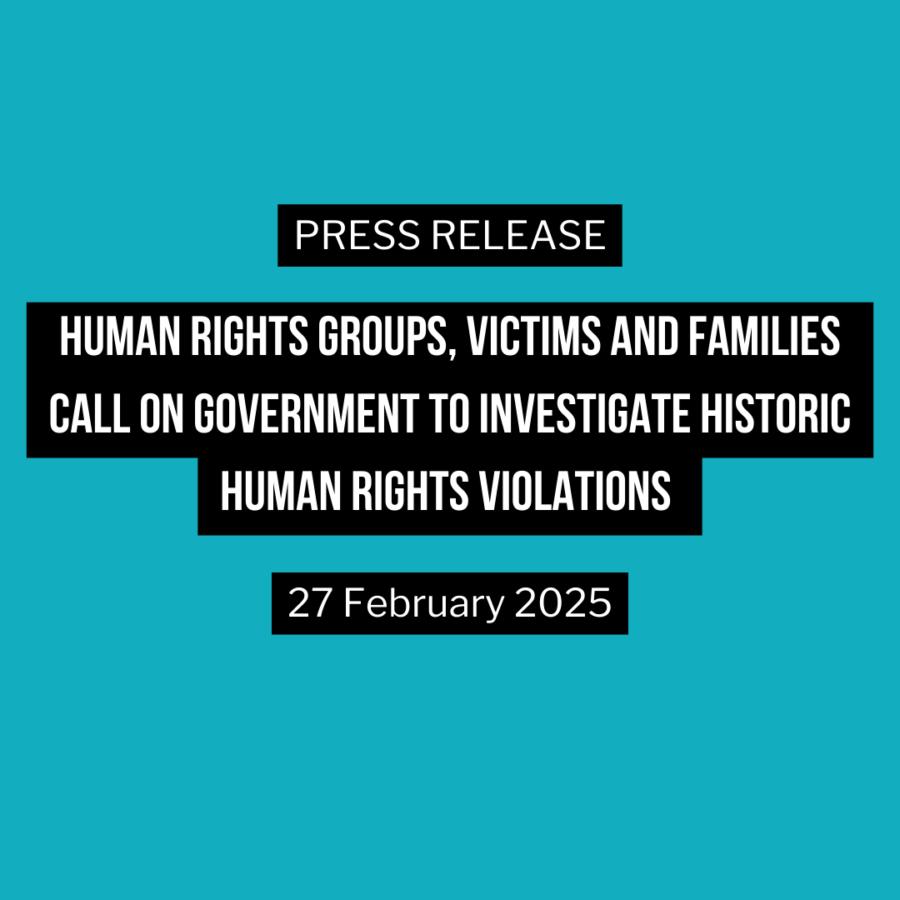27 February 2025 — A new cross-border report published today by the Irish Council for Civil Liberties (ICCL) and Northern Ireland’s Committee on the Administration of Justice (CAJ) calls on the Irish government to establish a Historical Investigations Unit (HIU) to investigate unresolved deaths and incidents of torture and ill-treatment, including (but not limited to) cases related to the Troubles.
The HIU is one of three mechanisms recommended by the report for Ireland to meet its legal obligations in relation to historic human rights violations and miscarriages of justice and to fully vindicate the rights of victims and survivors, many of whom have campaigned for decades for truth and justice.
In addition to the HIU, which would focus on assigning criminal responsibility for individual cases, the report also recommends that the government establish a system of robust and independent public inquiries and inquests, and an all-Ireland truth commission to examine themes and patterns relating to conflict-related violations.
Speaking today, Claire Mc Evoy, Acting Co-Director, ICCL, said:
“Ireland has clear legal obligations to address legacy human rights violations and miscarriages of justice. Case law from the European Court of Human Rights indicates that the State must not only prevent torture and loss of life, it must also act once an alleged violation has occurred by conducting investigations that are effective, prompt, thorough and transparent. And yet, we have a litany of victims, survivors and families in Ireland who have never learned the full truth of what happened to them or their loved one, or seen justice done.”
Daniel Holder, Director, CAJ, said:
“The Irish Government has played a strong and important role in holding the British Government to account for obstructing proper legacy investigations in the north, most commendably by taking an inter-state case to Europe challenging the appalling Northern Ireland UK Legacy Act brought in by Boris Johnson’s Government.
“Before it was unilaterally ditched by the UK to make way for the Legacy Act, the 2014 UK-Ireland Stormont House Agreement was to set up new institutions to investigate the legacy of the conflict, including a cross-border information-recovery body. There are however significant gaps for historic investigations in the Irish government’s jurisdiction. We again recommend there should be an Historical Investigations Unit in the south, as was envisaged for the north under the Stormont House Agreement.”
The new report, entitled ‘Policing for Peace and the Commitment to ‘Repeal And Replace’ the Northern Ireland Legacy Act: How Should the Irish Government Deal with Legacy Investigations in its Jurisdiction?’, is the result of a private ICCL and CAJ roundtable event held last year with academics, survivors, family members and advocates – a number of whom attended the launch today – and subsequent research by ICCL and CAJ.
Osgur Breatnach is one of the Sallins Men, who were wrongfully arrested, interrogated, detained and convicted for the Sallins train robbery in 1976. At the launch, he said:
“Failure to hold independent public inquiries for the hundreds of prisoners tortured down the years, constitutes daily, ongoing, cruel and inhuman treatment by the Irish Government, in itself a breach of the UN Covenant Against Torture and contrary to the European Convention of Human Rights, both signed up to, and ignored, by the Irish Government.”
Margaret Urwin also attended the launch on behalf of Justice for the Forgotten, a group of bereaved families and survivors seeking justice for the Dublin and Monaghan bombings of May 1974. She said:
“It is high time for the Irish authorities to put in place a mechanism for the investigation of legacy cases.”
Lucia O’Farrell’s son, Shane, was killed in a hit-and-run incident in 2011 by a man on conditional bail which had not been revoked despite broken conditions. She said:
“The reason Shane O’Farrell’s death merits investigation is because there were significant failings by the State which led to it. 13.5 years later, we still do not know the full details of how or why these failures occurred.”
Responding to the report at its launch today, Darragh Mackin, Partner at the Belfast-based law firm Phoenix Law, said:
“This report is a timely reminder to the Irish Government that they must practice what they preach. We know from past experiences that when push comes to shove, the Government is not seen wanting in respect of taking action to ensure human rights compliance. It is now long past time for action, to ensure effective independent human rights compliant investigations for all those families affected. Human rights compliance cannot cease to exist at the border.”
ENDS
Notes to editors
Media interviews
The following individuals are available for interview:
- Claire Mc Evoy, ICCL
- Daniel Holder, CAJ
- Osgur Breatnach
- Lucia O’Farrell
- Margaret Urwin
- Darragh Mackin, Phoenix Law
For media queries contact ruth.mccourt@iccl.ie / molly.kavanagh@iccl.ie / 087 415 7162.
Photos
Photos from the launch will be issued to media by Andrew Watchorn andrew@andrewwatchorn.com.
Report
The report is published on ICCL’s website at https://www.iccl.ie/wp-content/uploads/2025/02/Policing-for-Peace-Dublin-legacy-report-WEB.pdf.
About ICCL
The Irish Council for Civil Liberties (ICCL) is Ireland’s oldest independent human rights campaigning organisation. We monitor, educate and campaign to secure human rights for everyone in Ireland. www.iccl.ie

